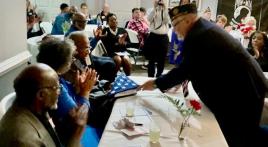80 years after Bataan, history has personal resonance in Colorado Springs for hero's son
• By STEPHANIE EARLS stephanie.earls@gazette.com April 13, 2022
Colorado Springs resident Whitney Galbraith is the son of U.S. Army Col. Nicoll F. Galbraith, who was responsible for the evacuation of Manila in 1942. Whitney discovered more than 1,000 pages of his father's writings, documenting his experiences in the war and as a POW of the Japanese.
Even after he retired from the Army to spend many long, good years reading books, playing bridge and leading a quiet life with his family in Colorado Springs, "Nick" Galbraith maintained the dignified demeanor of an officer. He wore a coat and tie every day and was a man of few spoken words - unless you knew the right questions to ask.
Whitney Galbraith now knows what those questions would be. But it's too late: his father died in 1986, at 89.
Luckily, the Army officer who played a key role, 80 years ago this week, in the evacuation of Manila prior to the Fall of the Philippines during World War II - including the safe evacuation of nurses, the Angels of Bataan, to Corregidor - was a prolific writer. He left behind his words, for history and his children, to discover.
"So much of what I knew about my father, when he was alive, was through osmosis," said Whitney, who is 83. "I knew the rough outline of his experience, but I was a young child during World War II and was only aware of the surface that he was gone, that he spent the war in prison camps, and that we got him back in 1945."
Whitney Galbraith knew his father had been a rigorous recorder and keeper of diaries, documents and artifacts during his time in the Philippines and throughout the 3 1⁄2 years he'd spent as a prisoner of war, in Luzon and camps in Taiwan and China, where he was when Japanese forces surrendered in 1945.
He didn't realize just how comprehensive the collection was until he and his older brother, Nicoll Jr., set about selecting items for a 2010 Pioneers Museum exhibit about American POWs during World War II.
"That's when I just stumbled on this, on a dark, dusty shelf," said Whitney, sitting at his kitchen table next to a box filled with reams of sepia-toned pages stored in plastic.
More than 1,000 "flimsies," some typed, many handwritten in loose lines of slanted script. A memoir, in third person.



